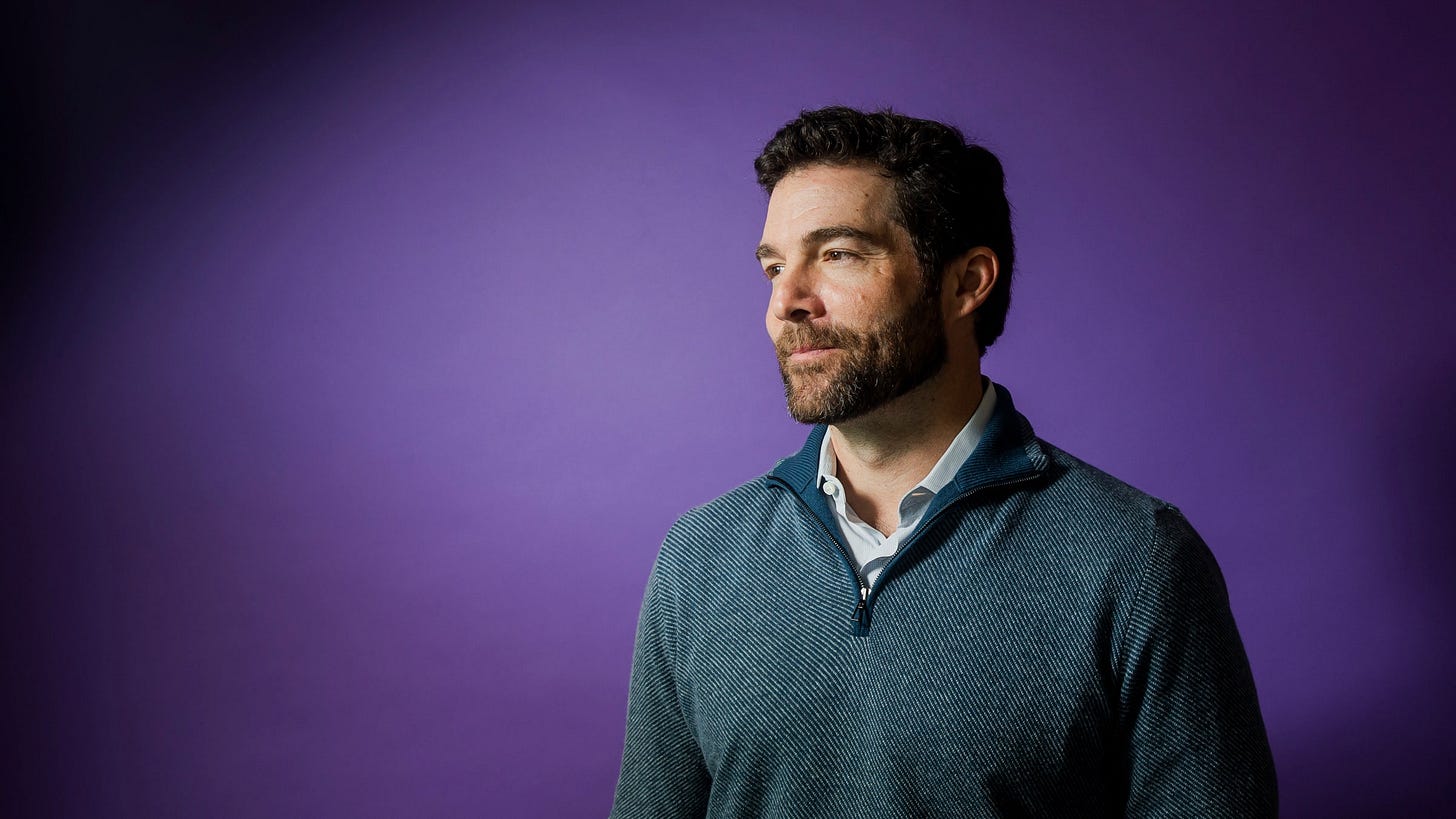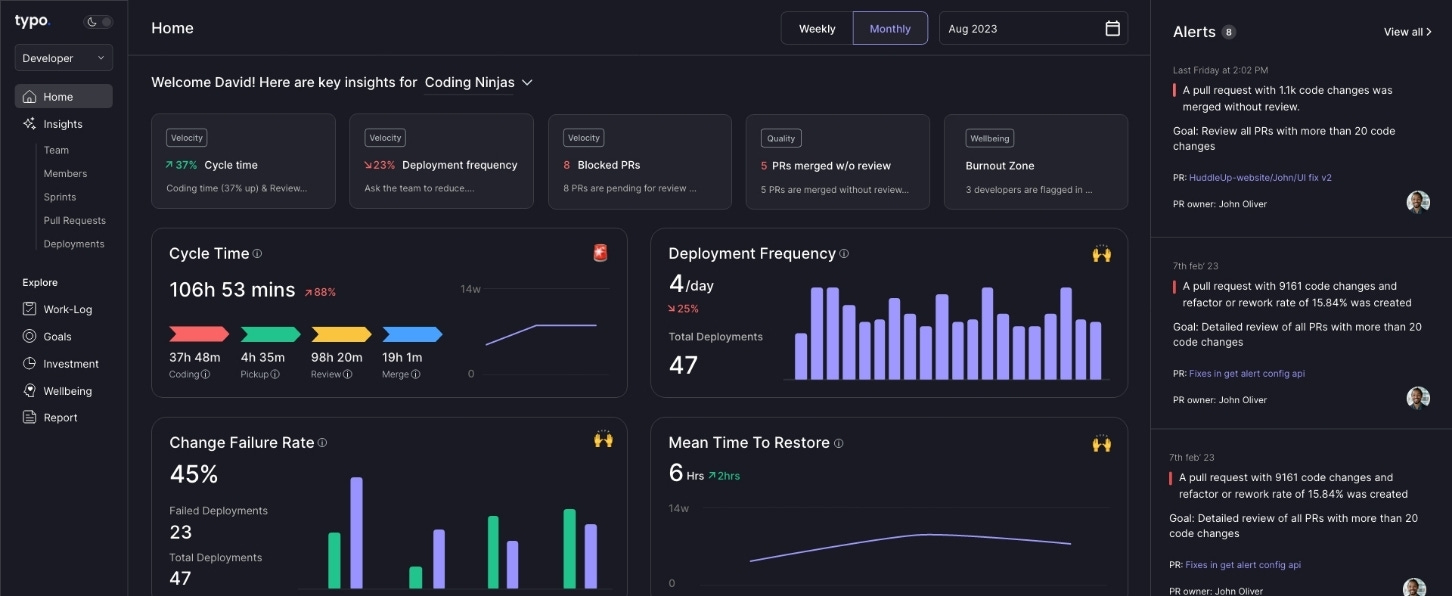The Hagakure #72: The Losing Game of Zero Trust
In this day and age, trust is probably your biggest competitive advantage. And the absence of it is likely your downfall.
Typo - Ship better software faster🚀
This week’s Hagakure is brought to you by Typo.
While metrics are always contextual and never the full story, they are an indispensable part of continuous improvement—something I deeply believe in and hold as a “non-negotiable.”
When I connected with Typo’s co-founder Kovid Batra we hit it off immediately, as our views on improving “how work works” were obviously aligned.
Soon after, I got to know the app itself, and it truly resonated with me as a former VP of Engineering. I wouldn’t have accepted a sponsorship otherwise.
What I also love about Typo is that it integrates developer well-being as a first-class citizen. I know from experience that without that foundation nothing else works.
By seamlessly integrating with the dev tool stack (Git, Issue Tracker, CI/CD, Incident Management, Slack), Typo connects the dots between engineering signals & developer well-being to build efficient teams that deliver on time.
Typo helps tech teams deliver at every level:
For Leaders. Align engineering with business goals & support teams to deliver their best with developer well-being insights
For Managers. Identify delivery bottlenecks, predict release delays & drive continuous improvement with customized team goals & weekly progress reports
For Developers. Ship code faster with automated dev workflows in Slack & measure the impact of your work on team goals.
Onwards to this week’s topic. 👇

In The Curious Case of McKinsey, I made the following point about the quest for measuring developer productivity:
I really don’t know if it’s about running from responsibility as much as it is saying, “I’m done trying to talk to you, give me cold hard data, so we can make our decisions.”
Zero trust.
If I don’t trust you, and you know I don’t, and I go around hunting data about you in order to do something to you… will you trust me more?
Didn’t think so.
I will trust you even less, if that’s possible. I might try to sandbag you, or even sabotage you. Unreasonable systems make unreasonable people.
This got me thinking.
What are the real consequences of zero trust? Can we afford to not address that? Do we care? And even if want to, are we even able?
“Trust” is one of those overused words inside and around organizations. And sure, we all pay lip service to the importance of trust. Trust this, trust that.
That’s a lot of results.
I read through all of them so you don’t have to. And this is what I learned…
Just kidding.
Are We Available to Trust?
Do we fundamentally believe trust to be indispensable for business performance?
Or do we, deep down, think that people are paid to do a job, and should just STFU and get on with it?
One way to look at this question is through what professor Douglas McGregor, back in 1960, called Theory X and Theory Y. These suggest two starkly different views of individuals (employees):
Theory X: The majority of people are inherently disinterested in their work, avoid taking responsibility, and require constant supervision and control. They are believed to lack intrinsic motivation and ambition, relying on external rewards and threats to perform their tasks effectively.
Theory Y: Most individuals are intrinsically motivated and take pride in their work. They seek opportunities to contribute creatively, actively engage in decision-making processes, and willingly accept responsibility.
I suspect very few people would read this and claim they’re staunch supporters of Theory X, right?
Right?
But then, I look at most companies and I observe…
Command-and-control structures
Punishment and rewards model of motivation
Stringent upwards reporting
Tons of “roadmap meetings” with superiors
Engineers as far away as they can be from product, design and customers
Excessive bureaucracy for everything
A whole rigamarole to justify a $50 expense
(Often) Micromanagement
(Often) Time-tracking and other attendance-related shenanigans
…and I wonder if we really want to trust people or just pretend that we do.
Are we merrily convinced we are “people-first” Theory Y followers but in practice simply run with Theory X?
Here’s the sad part:
We are so used to these prevailing systems of management that we are unable to see their dark underbelly. Many just feel the consequences in the form of stress, anxiety, despair, burnout, resentment. I know I did.
It’s hard to trust each other when the systems we exist in silently reminds us at every turn that we really don’t.
Trust Makes Business Sense
One way to illuminate the consequences of not taking trust seriously as foundational to business is through Patrick Lencioni’s wonderful book The Five Dysfunctions of a Team.
Through the story of a dysfunctional executive team, it shows how the absence of trust leads to fear of conflict which in turns ensures lack of commitment as individuals feign agreement but don’t truly buy in and commit to decisions.
This in turn leads to an avoidance of accountability as people hesitate to call others out in the absence of a real plan of action, finally leading to inattention to results where individual needs take precedence over collective goals.
If I wanted my business to fail, that is exactly what I would do.
Stephen R. Covey, author of The 7 Habits of Highly Effective People, also wrote a lesser known but no less relevant book called The Speed of Trust. Here’s how he puts it (emphasis mine):
“Trust is a performance multiplier, it is an accelerator, it is not just some nice soft warm a fuzzy social virtue... Any time you can increase the trust you will increase the speed and decrease the cost... Take away trust everything slows down and grinds to a halt... Speed happens when you trust each other and when you are trusted speed will happen with you. Nothing is as fast as the speed of trust.”
One final perspective on the business value of trust comes from warfare. While I wouldn’t advocate to view business as war, this particular example strikes me as useful.
John Boyd (of OODA loop fame) emphasized “moral warfare” as part of his account of strategy. Moral not in the ethical sense of right and wrong, but in terms of codes of conduct or standards of behavior that condition our emotional/intellectual responses.
In other words, the terms on which we get along with each other constrain how we effectively respond to circumstances.
As described in this blog post:
To put it simply, the moral aspect of war or conflict can be described in terms of trust. If we are teammates or allies, can we trust each other? Do our enemies trust each other? Trust leads to effective collaboration and coordination; mistrust leads to failure. Therefore, the side with more shared trust will succeed.
A competitive advantage if I’ve ever seen one.
It really blows my mind to observe so many startups trying to do great business things, while internally rife with mistrust and not even noticing it. Literally like trying to accelerate the car with the handbrake up.
No Shortcut to Trust
The paradox of trust is that it can’t be directly built (“You have to trust me!”)— you have to be intentional about showing up in ways that leads to trust.
As Ed Schein writes in Humble Inquiry, it’s really quite simple:
“Trust in the context of a conversation is believing that the other person will acknowledge me, not take advantage of me, not embarrass or humiliate me, tell me the truth, and, in the broader context, not cheat me, work on my behalf, and support the goals we have agreed to… We know intuitively and from experience that we work better in a complex interdependent task with someone we know and trust.”
In other words, you are trusted by virtue of being trustworthy. Or as Charlie Munger says, “Be worthy of a worthy mate.”
Trust is an emergent property of a relationship, and ultimately of a system. For better or worse, it is a consequence of how interactions between individuals play out over a long period of time. And the collective level of trust inside any team or organization is the ongoing balance of all of those.
You don’t create psychological safety. You behave in ways that make the place safe.
My favorite definition of trust comes from one of my management heroes, Jeff Weiner:
Trust is consistency over time.

Consistency in what?
Everything.
For example, you might think nothing of regularly being a few minutes late to 1:1s or other meetings. What’s the issue, you ask? It’s simply that you are consistently signaling to someone else that something else was more important to you than they are. You might not mean that, but that’s the impact in most cases, nonetheless.
Another common pitfall I observe (with inexperienced engineering leaders in particular) is not minding proactive communication with their manager, surfacing wins and progress, as well as their thought process on things. What ends up happening is that they only talk about problems. The result is a perception that problems is all there is! From there, it’s a small step to conclude that this leader is not the right person for the job.
It’s also about aligning what you say and what you do religiously. It’s about making commitments and keeping them. Or if you can’t (because sh*t happens), showing the respect to let the other person (or group) know in advance and seek a re-commitment on something that works for all involved.
What cannot happen is to implicitly signal to others “don’t take me seriously the next time I tell you I’ll do something.” Nothing erodes trust faster than that. I know a VP of Engineering who could be world-class but this is their achilles heel. So they’re stuck at average.
You lead by example whether you like it or not, for better or for worse.
Are We On The Same Team?
A team is a group of people who depend on each other to achieve a common goal.
Nothing builds trust more effectively than people working together and depending on each other to achieve common goals.
Which brings me one last time to this lack of trust between executives and engineering leaders. It’s rare for me to come into contact with a company where those work as a true team. Engineering inevitably falls into the learned helplessness of remaining downstream from everyone else, and accepting that this is just how the world works.
Without dependence and collaboration, trust is virtually impossible by design. Couple that with hierarchical, pyramid-shaped org structures, and it becomes very clear who’s boss and who’s not. And our brains don’t particularly like the perception of reduced relative status.
If we’re on the same team, it doesn’t really feel like it.
Which is why the approach I take with coaching clients struggling with this is to remind themselves of what unites them with their executives before losing their minds over what keeps them apart. Too often, what an executive defines as success is not at all what the head of engineering believes success is, and then it’s something else entirely (e.g. “meet the sprint goals”) for the engineers, too.
Until we have common goals, and we truly start depending on each other (not just executives depending on engineering but also the other way around), we’re stuck in the perpetual game of zero trust.
No bueno.
The Trust Wager
One last thought about trust.
Have you ever considered whether you trust or mistrust by default?
In BE 2.0, Jim Collins recounts a few beautiful stories of what he learned from his mentor Bill Lazier. One of them is about trust. After a few bad decisions regarding people, Jim sought his mentor’s advice on whether he should be less trusting. Bill said:
“Jim, this is one of the big forks in the road of life. On one path, you first assume that someone is trustworthy and you hold that view until you have incontrovertible evidence to the contrary; on the other path, you first assume that someone isn’t trustworthy until he or she proves to you that trust is merited. You have to choose which path you want to walk and stick with it.”
Jim wasn’t convinced. Wouldn’t he be exposing himself to be burned a lot? Bill told him:
“What’s the upside to mistrust? You minimize pain and disappointment. What’s the downside to mistrust? If you assume people are not trustworthy, you will demotivate and drive away the best people.”
This was Bill’s “Trust Wager”—a hardheaded belief that there is more upside and less downside to an opening bid of trust than an opening bid of mistrust.
And if you ask me, not driving away the best people seems to make a lot of business sense, too.





I'm surprised it's the first time I hear about the X and Y theory. IT closely resembles Bill Lazier's message - you have to choose one of the approaches.
My feeling is that it becomes harder, the more dissappointments you have. People you trusted and violated that, or people who games the system. Also the further away you are from the people, the closer you are to Theory X. That's what we see now, with the return-to-office polices.
It's a lot harder to trust a 'faceless' employee that you don't know, then your direct report. So when the decisions are made at mass, the scale tips.